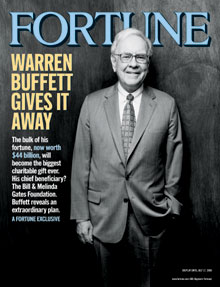Warren Buffett gives away his fortune
NEW YORK (FORTUNE Magazine) - We were sitting in a Manhattan living room on a spring afternoon, and Warren Buffett had a Cherry Coke in his hand as usual. But this unremarkable scene was about to take a surprising turn.
"Brace yourself," Buffett warned with a grin. He then described a momentous change in his thinking. Within months, he said, he would begin to give away his Berkshire Hathaway fortune, then and now worth well over $40 billion.
 | |||
 | |||
| | |||
| | |||
| | |||
| |
This news was indeed stunning. Buffett, 75, has for decades said his wealth would go to philanthropy but has just as steadily indicated the handoff would be made at his death. Now he was revising the timetable.
"I know what I want to do," he said, "and it makes sense to get going." On that spring day his plan was uncertain in some of its details; today it is essentially complete. And it is typical Buffett: rational, original, breaking the mold of how extremely rich people donate money.
Buffett has pledged to gradually give 85% of his Berkshire stock to five foundations. A dominant five-sixths of the shares will go to the world's largest philanthropic organization, the $30 billion Bill & Melinda Gates Foundation, whose principals are close friends of Buffett's (a connection that began in 1991, when a mutual friend introduced Buffett and Bill Gates).
The Gateses credit Buffett, says Bill, with having "inspired" their thinking about giving money back to society. Their foundation's activities, internationally famous, are focused on world health -- fighting such diseases as malaria, HIV/AIDS, and tuberculosis -- and on improving U.S. libraries and high schools.
Up to now, the two Gateses have been the only trustees of their foundation. But as his plan gets underway, Buffett will be joining them. Bill Gates says he and his wife are "thrilled" by that and by knowing that Buffett's money will allow the foundation to "both deepen and accelerate" its work. "The generosity and trust Warren has shown," Gates adds, "is incredible." Beginning in July and continuing every year, Buffett will give a set, annually declining number of Berkshire B shares - starting with 602,500 in 2006 and then decreasing by 5% per year - to the five foundations. The gifts to the Gates foundation will be made either by Buffett or through his estate as long as at least one of the pair -- Bill, now 50, or Melinda, 41 -- is active in it.
Berkshire's price on the date of each gift will determine its dollar value. Were B shares, for example, to be $3,071 in July - that was their close on June 23 - Buffett's 2006 gift to the foundation, 500,000 shares, would be worth about $1.5 billion. With so much new money to handle, the foundation will be given two years to resize its operations. But it will then be required by the terms of Buffett's gift to annually spend the dollar amount of his contributions as well as those it is already making from its existing assets. At the moment, $1.5 billion would roughly double the foundation's yearly benefactions. But the $1.5 billion has little relevance to the value of Buffett's future gifts, since their amount will depend on the price of Berkshire's stock when they are made. If the stock rises yearly, on average, by even a modest amount - say, 6% - the gain will more than offset the annual 5% decline in the number of shares given. Under those circumstances, the value of Buffett's contributions will rise.
Buffett himself thinks that will happen. Or to state that proposition more directly: He believes the price of Berkshire, and with it the dollar size of the contributions, will trend upward - perhaps over time increasing substantially. The other foundation gifts that Buffett is making will also occur annually and start in July. At Berkshire's current price, the combined 2006 total of these gifts will be $315 million. The contributions will go to foundations headed by Buffett's three children, Susan, Howard, and Peter, and to the Susan Thompson Buffett Foundation.
This last foundation was for 40 years known simply as the Buffett Foundation and was recently renamed in honor of Buffett's late wife, Susie, who died in 2004, at 72, after a stroke. Her will bestows about $2.5 billion on the foundation, to which her husband's gifts will be added. The foundation has mainly focused on reproductive health, family planning, and pro-choice causes, and on preventing the spread of nuclear weapons. Counting the gifts to all five foundations, Buffett will gradually but sharply reduce his holdings of Berkshire (Charts) stock. He now owns close to 31% of the company-worth nearly $44 billion in late June - and that proportion will ultimately be cut to around 5%. Sticking to his long-term intentions, Buffett says the residual 5%, worth about $6.8 billion today, will in time go for philanthropy also, perhaps in his lifetime and, if not, at his death.
Because the value of Buffett's gifts are tied to a future, unknowable price of Berkshire, there is no way to put a total dollar value on them. But the number of shares earmarked to be given have a huge value today: $37 billion.
That alone would be the largest philanthropic gift in history. And if Buffett is right in thinking that Berkshire's price will trend upward, the eventual amount given could far exceed that figure.
So that's the plan. What follows is a conversation in which Buffett explains how he moved away from his original thinking and decided to begin giving now. The questioner is yours truly, FORTUNE editor-at-large Carol Loomis. I am a longtime friend of Buffett's, a Berkshire Hathaway shareholder, and a director of the Susan Thompson Buffett Foundation.
No comments:
Post a Comment